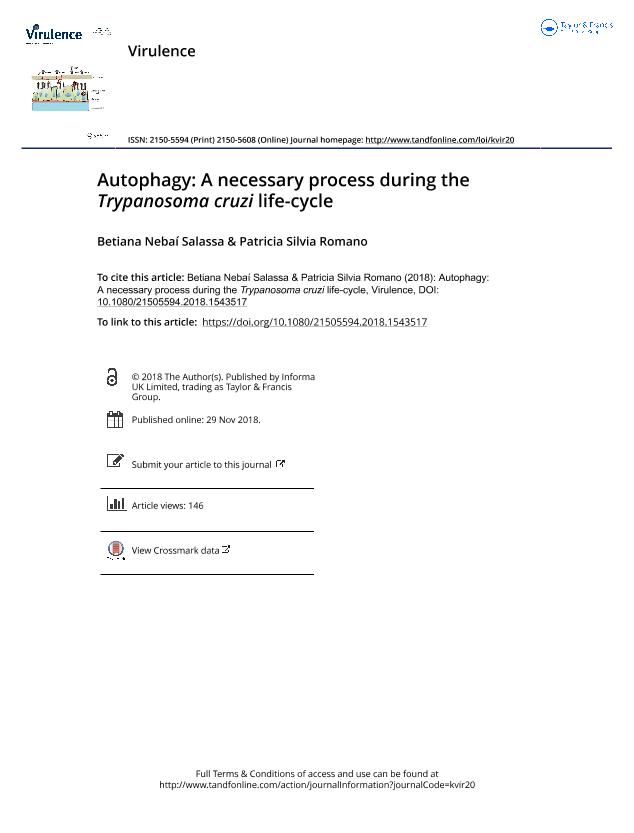Mostrar el registro sencillo del ítem
dc.contributor.author
Salassa, Betiana Nebaí

dc.contributor.author
Romano, Patricia Silvia

dc.date.available
2019-11-29T21:28:25Z
dc.date.issued
2019-01
dc.identifier.citation
Salassa, Betiana Nebaí; Romano, Patricia Silvia; Autophagy: A necessary process during the Trypanosoma cruzi life-cycle; Taylor & Francis; Virulence; 10; 1; 1-2019; 460-469
dc.identifier.issn
2150-5594
dc.identifier.uri
http://hdl.handle.net/11336/91048
dc.description.abstract
Autophagy is a well-conserved process of self-digestion of intracellular components. T. cruzi is a protozoan parasite with a complex life-cycle that involves insect vectors and mammalian hosts. Like other eukaryotic organisms, T. cruzi possesses an autophagic pathway that is activated during metacyclogenesis, the process that generates the infective forms of parasites. In addition, it has been demonstrated that mammalian autophagy has a role during host cell invasion by T. cruzi, and that T. cruzi can modulate this process to its own benefit. This review describes the latest findings concerning the participation of autophagy in both the T. cruzi differentiation processes and during the interaction of parasites within the host cells. Data to date suggest parasite autophagy is important for parasite survival and differentiation, which offers interesting prospects for therapeutic strategies. Additionally, the interruption of mammalian autophagy reduces the parasite infectivity, interfering with the intracellular cycle of T. cruzi inside the host. However, the impact on other stages of development, such as the intracellular replication of parasites is still not clearly understood. Further studies in this matter are necessaries to define the integral effect of autophagy on T. cruzi infection with both in vitro and in vivo approaches.
dc.format
application/pdf
dc.language.iso
eng
dc.publisher
Taylor & Francis

dc.rights
info:eu-repo/semantics/openAccess
dc.rights.uri
https://creativecommons.org/licenses/by-nc-sa/2.5/ar/
dc.subject
ATG8.1
dc.subject
HOST CELL
dc.subject
LC3
dc.subject
METACYCLOGENESIS
dc.subject
T. CRUZI
dc.subject
T. CRUZI INFECTION
dc.subject.classification
Bioquímica y Biología Molecular

dc.subject.classification
Medicina Básica

dc.subject.classification
CIENCIAS MÉDICAS Y DE LA SALUD

dc.title
Autophagy: A necessary process during the Trypanosoma cruzi life-cycle
dc.type
info:eu-repo/semantics/article
dc.type
info:ar-repo/semantics/artículo
dc.type
info:eu-repo/semantics/publishedVersion
dc.date.updated
2019-10-23T19:29:31Z
dc.identifier.eissn
2150-5608
dc.journal.volume
10
dc.journal.number
1
dc.journal.pagination
460-469
dc.journal.pais
Reino Unido

dc.journal.ciudad
Londres
dc.description.fil
Fil: Salassa, Betiana Nebaí. Universidad Nacional de Cuyo. Facultad de Odontologia; Argentina. Consejo Nacional de Investigaciones Científicas y Técnicas. Centro Científico Tecnológico Conicet - Mendoza. Instituto de Histología y Embriología de Mendoza Dr. Mario H. Burgos. Universidad Nacional de Cuyo; Argentina
dc.description.fil
Fil: Romano, Patricia Silvia. Consejo Nacional de Investigaciones Científicas y Técnicas. Centro Científico Tecnológico Conicet - Mendoza. Instituto de Histología y Embriología de Mendoza Dr. Mario H. Burgos. Universidad Nacional de Cuyo. Facultad de Ciencias Médicas. Instituto de Histología y Embriología de Mendoza Dr. Mario H. Burgos; Argentina
dc.journal.title
Virulence
dc.relation.alternativeid
info:eu-repo/semantics/altIdentifier/url/https://www.tandfonline.com/doi/full/10.1080/21505594.2018.1543517
dc.relation.alternativeid
info:eu-repo/semantics/altIdentifier/doi/http://dx.doi.org/10.1080/21505594.2018.1543517
Archivos asociados
